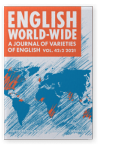Vol. 42:2 (2021) ► pp.145–174
“I just sound Sco[ʔ]ish now”
The acquisition of word-medial glottal replacement by Polish adolescents in Glasgow
This article investigates the speech of adolescents who have moved directly from Poland to Glasgow, using data from a range of social contexts and comparing their speech to that of their locally-born peer-group. Focusing on the acquisition of word-medial glottal replacement, I find that the Polish participants have replicated one of the constraints shown by their locally-born peers (number of syllables), have come close to replicating another (following segment), and have three which are not significant for the Glaswegians: lexical frequency, preceding segment and speech context. The emergence of the speech context constraint for the Polish group (and not for the Glaswegians) is a novel finding, and sheds light on how learners come to understand and negotiate style in the L2. I suggest that as they are going through the acquisition process, the Polish group use speech context as an interpretive framework around which they structure their stylistic variation.
Article outline
- 1.Introduction
- 2.Previous research
- 2.1Acquiring stylistic constraints in a new language
- 2.2Glottal replacement
- 3.Methodology
- 3.1The participants
- 3.2The speech data
- 4.Analysis and results
- 4.1Circumscribing the variable context
- 4.2Coding the variants
- 4.3Statistical modelling
- 4.4Potential constraints
- 4.5Comparison of the groups
- 4.6Stages of acquisition
- 5.Discussion
- 6.Conclusions
- Notes
-
References
